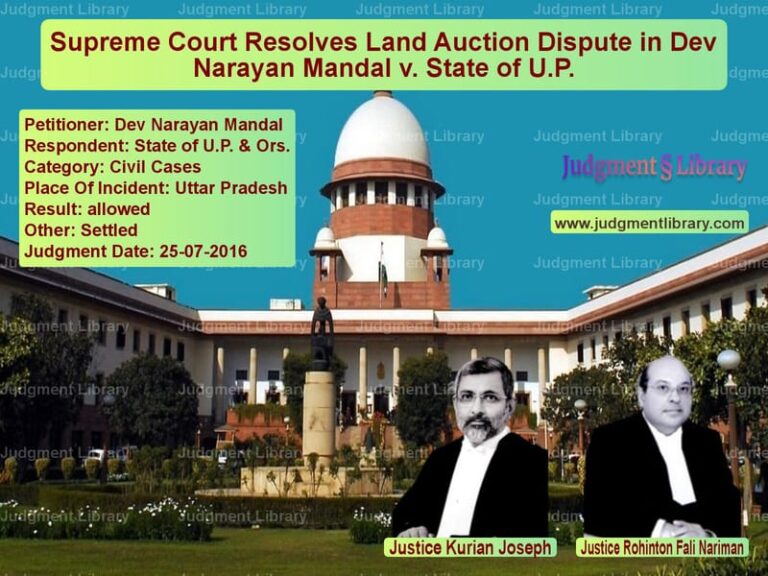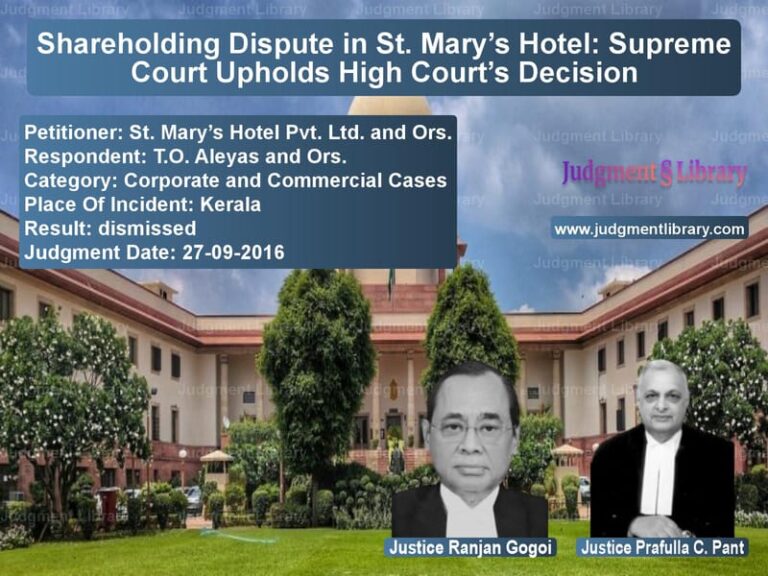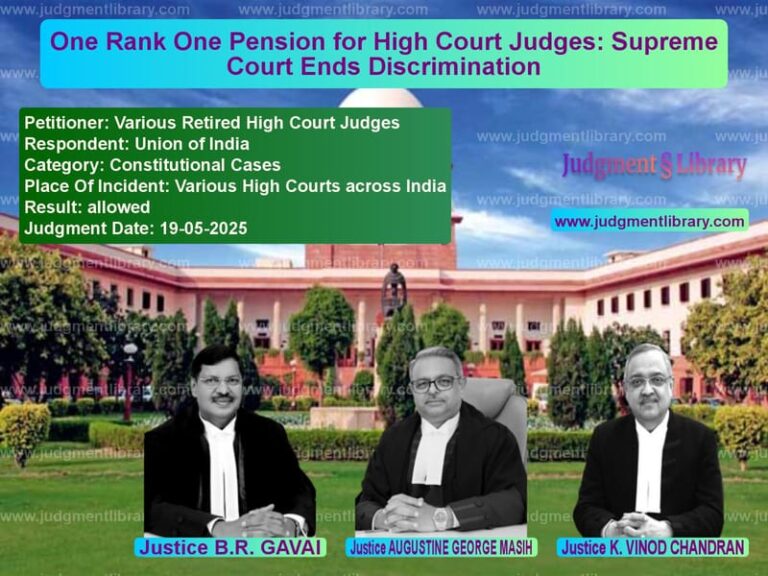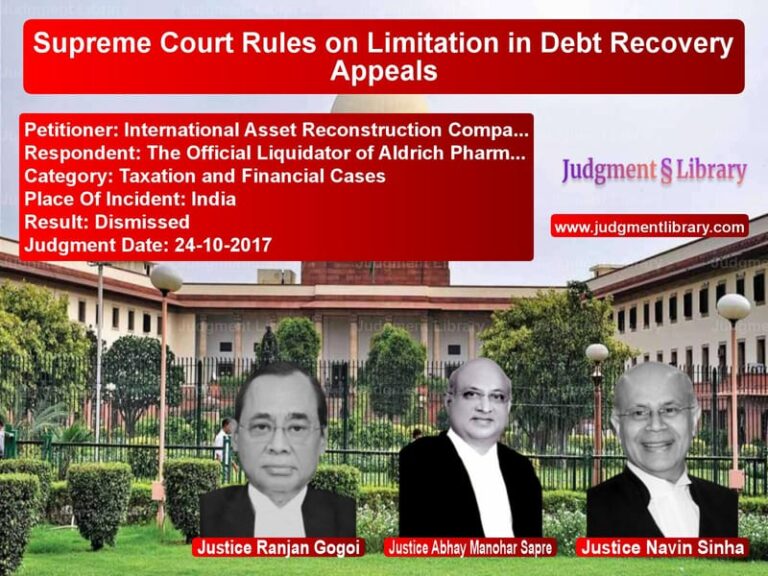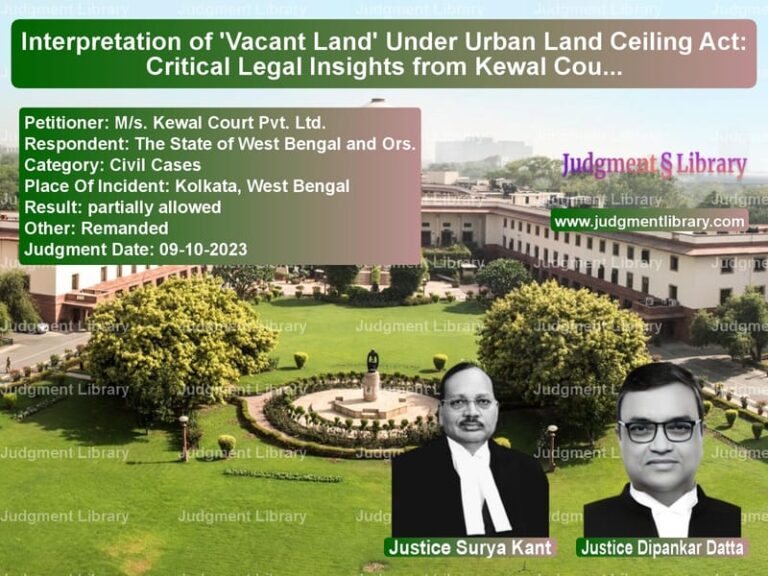Supreme Court Upholds Conviction in Rash and Negligent Driving Case: No Leniency in Road Safety Violations
The Supreme Court of India has upheld the conviction and sentence of James in a case of rash and negligent driving that resulted in the death of a motorcyclist. The Court rejected the plea for leniency and reaffirmed the importance of road safety, ruling that the six-month simple imprisonment imposed under Section 304A of the Indian Penal Code (IPC) was justified given the severity of the offense.
Background of the Case
The case stems from a road accident that occurred on October 18, 2009, on NH 206 in Karnataka. The key facts are:
- The petitioner, James, was driving a Toyota Qualis with registration number KA-01/M-3840 from Bhadravathi to Tarikere.
- At approximately 1:00 PM, he allegedly drove at a high speed and in a reckless manner, colliding with a TVS motorcycle ridden by Dinesh Kailaje, who had his son as a pillion rider.
- Dinesh suffered severe injuries and succumbed to them on October 21, 2009, at KMC Hospital, Mangalore.
- The police registered Crime No. 473/2010 under Sections 279 (rash driving) and 304A (causing death by negligence) of the IPC.
- The trial court convicted James, imposing a fine of ₹1,000 under Section 279 IPC and sentenced him to six months simple imprisonment for the offense under Section 304A IPC.
Appeals and High Court’s Ruling
James appealed against his conviction:
- The Fast Track Court at Bhadravathi upheld the conviction on January 24, 2015.
- The Karnataka High Court dismissed his criminal revision petition on July 8, 2022, affirming that the prosecution had proven the case beyond a reasonable doubt.
Supreme Court’s Examination
James approached the Supreme Court, contending:
- The evidence did not establish his guilt beyond doubt.
- There was contributory negligence by the deceased motorcyclist.
- The prosecution’s key witnesses were relatives of the deceased and thus unreliable.
- There were contradictions in the witness statements.
- The Motor Vehicle Inspector’s report (Ex. P.11) suggested the accident was due to the motorcyclist’s negligence.
The State of Karnataka, defending the conviction, argued that all courts had rightly appreciated the evidence, and there was no ground for interference.
Key Findings of the Supreme Court
The Supreme Court, comprising Justices Sudhanshu Dhulia and Prasanna B. Varale, made the following key observations:
1. Credibility of Witnesses
The Court rejected the argument that prosecution witnesses were unreliable solely because they were related to the deceased. The testimony of eyewitnesses was consistent and corroborated by medical evidence.
“The testimonies of PW3 and PW4 establish that the accused was driving at high speed and negligently struck the deceased from behind.”
2. No Evidence of Contributory Negligence
James claimed that the deceased made a sudden turn, leading to the accident. However, the Court found that the deceased had turned on his indicator before turning left and was riding carefully.
“The Qualis vehicle had ample space to maneuver but still collided with the deceased, dragging the motorcycle for 15 feet. This is clear evidence of rash and negligent driving.”
3. Medical Evidence Confirmed Negligence
The post-mortem report showed 19 injuries on the deceased’s body, confirming blunt force trauma due to the impact. The injuries were consistent with high-speed impact.
4. Motor Vehicle Inspector’s Report Not Sufficient to Overturn Conviction
The defense relied on Ex. P.11 (Motor Vehicle Inspector’s report), which suggested some negligence on the part of the deceased. However, the Court ruled that this document alone could not override eyewitness accounts and medical evidence.
5. Leniency Denied Due to Seriousness of the Offense
The defense sought a reduction in the sentence, arguing that James was the sole breadwinner and had no prior criminal record. The Court rejected this plea, stating:
“The loss of a human life due to reckless driving cannot be taken lightly. The sentence imposed is justified.”
Final Judgment
The Supreme Court ruled:
- The appeal was dismissed.
- The conviction and sentence of six months simple imprisonment under Section 304A IPC was upheld.
- The ₹1,000 fine for rash driving under Section 279 IPC was upheld.
- No reduction in sentence was granted.
Implications of the Judgment
This ruling has significant implications for road safety laws and traffic offenses:
1. No Leniency for Rash and Negligent Driving
The judgment reinforces that reckless drivers will face strict legal consequences.
2. Credibility of Eyewitnesses
The ruling affirms that witnesses related to the deceased can be credible if their testimony is consistent and corroborated by other evidence.
3. No Benefit of Doubt for High-Speed Impact
Drivers involved in accidents resulting from excessive speed cannot escape liability by claiming contributory negligence of the victim.
Conclusion
The Supreme Court’s ruling in James vs. State of Karnataka underscores the importance of responsible driving and the legal consequences of reckless behavior on the road. By upholding the conviction and sentence, the Court has sent a strong message that road safety violations leading to fatalities will be met with strict legal action. The judgment serves as a crucial precedent for traffic laws and criminal liability in road accidents.
Petitioner Name: James.Respondent Name: State of Karnataka.Judgment By: Justice Sudhanshu Dhulia, Justice Prasanna B. Varale.Place Of Incident: Bhadravathi, Karnataka.Judgment Date: 20-12-2024.
Don’t miss out on the full details! Download the complete judgment in PDF format below and gain valuable insights instantly!
Download Judgment: james-vs-state-of-karnataka-supreme-court-of-india-judgment-dated-20-12-2024.pdf
Directly Download Judgment: Directly download this Judgment
See all petitions in Road Accident Cases
See all petitions in Negligence Claims
See all petitions in Motor Vehicle Act
See all petitions in Judgment by Sudhanshu Dhulia
See all petitions in Judgment by Prasanna Bhalachandra Varale
See all petitions in dismissed
See all petitions in supreme court of India judgments December 2024
See all petitions in 2024 judgments
See all posts in Criminal Cases Category
See all allowed petitions in Criminal Cases Category
See all Dismissed petitions in Criminal Cases Category
See all partially allowed petitions in Criminal Cases Category


